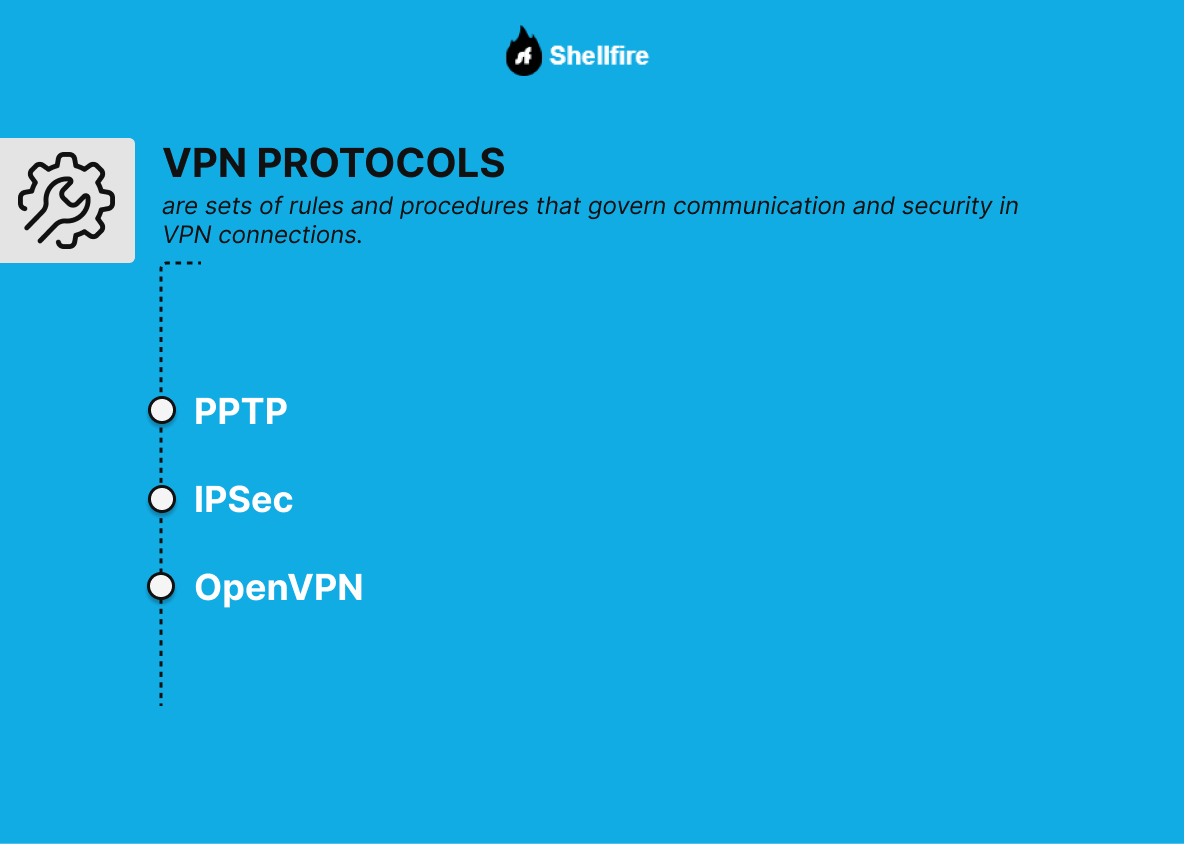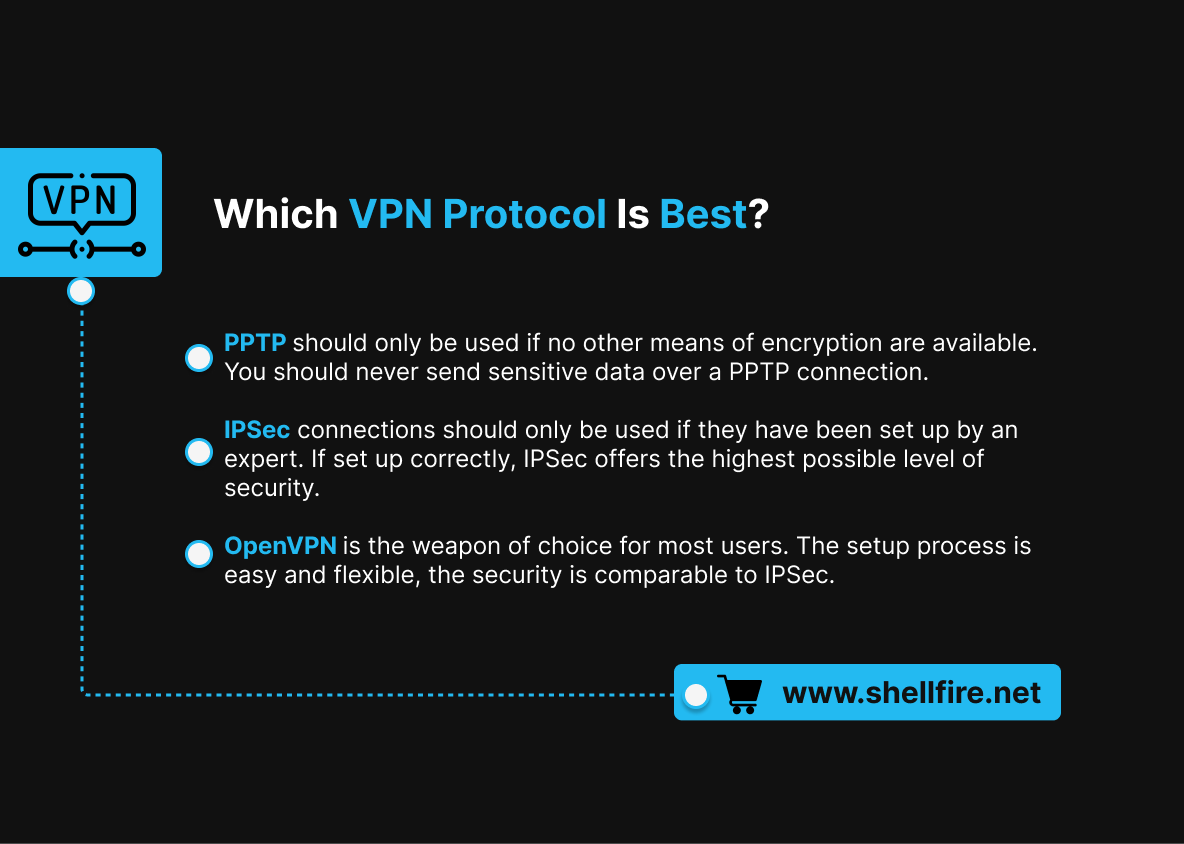PPTP vs. IPSec vs. OpenVPN – What are the differences?
If you’ve been diving into the world of virtual private networks, you’ve probably come across the trio of heavyweights: PPTP, IPSec, and OpenVPN. Questions about the differences between these protocols are like a daily special on our FAQ menu.
Well, fear not, because we’re here to untangle the VPN jargon for you in a way that won’t make your head spin. No rocket science, just the good stuff. So, buckle up, grab your coffee, and let’s break down PPTP vs. IPSec vs. OpenVPN without going all techno-babble on you. Let the showdown begin!
Table of Contents
Key facts
- PPTP, known as the “dinosaur” among VPN protocols, is user-friendly and widely available but suffers from significant security flaws.
- IPSec, encompassing various connection protocols, addresses PPTP’s weaknesses but introduces complexities in setup, potentially leading to unsafe configurations.
- OpenVPN is easy setup, strong encryption, and good protection against man-in-the-middle attacks make it a preferred choice for many users.
VPN Protocols: What Are They?
VPN protocols, or Virtual Private Network protocols, are sets of rules and procedures that govern communication and security in Virtual Private Network connections. These protocols facilitate the creation of secure tunnels over public networks, such as the Internet, allowing users to access a private network securely and remotely. Some of the most common VPN protocols include:
- PPTP
- IPSec
- OpenVPN
With Shellfire VPN, you can switch between all three VPN protocols any time.

1. PPTP
Often referred to as the “dinosaur” of VPNs, PPTP has been widely integrated into operating systems for more than two decades due to its ease of setup. However, the aging protocol is plagued by vulnerabilities that compromise its security. Recent discoveries have exposed weaknesses in PPTP’s encryption, allowing hackers to decrypt encrypted data with relatively modest computing resources, which are now readily available through cloud services.
For organizations with formidable resources, such as the NSA or GCHQ, decrypting PPTP data is a minimal challenge. The protocol’s susceptibility to man-in-the-middle (MITM) attacks is a notable concern, as the lack of authentication for remote partners allows MITM scenarios to be set up seamlessly. In such attacks, all encrypted data transfer is exposed to potential interception.
Adding to the list of drawbacks, PPTP is often blocked by routers and firewalls by default in today’s environments, often unintentionally. This unintentional blocking, coupled with incompatibility with dual-stack lite (ds-lite) Internet connections, makes PPTP an increasingly impractical choice for users seeking secure and reliable VPN connections.
Advantages of PPTP
- Simple setup process
- “Out of the box” support on nearly any operating system
- No need for additional software installation
Disadvantages of PPTP
- Vulnerable encryption
- Lack of protection against man-in-the-middle (MITM) attacks
- Limited compatibility with firewalls and routers
- Susceptibility to being easily blocked by network providers
¡Try Shellfire’s free VPN by clicking here!
2. IPSec
IPsec, which consists of a variety of connection protocols, is commonly paired with key exchange protocols such as IKEv1 or IKEv2, the latter also known as Cisco IPSec. The use of L2TP/IPSec has declined recently. Similar to PPTP, IPsec is readily available “out of the box” in most modern operating systems.
While IPsec attempts to address the known weaknesses of PPTP, which performs adequately in most scenarios, its versatility in configuration introduces complexity that poses challenges for non-experts. This complexity can lead to the inadvertent creation of seemingly functional but ultimately insecure IPsec connections.
There are several considerations when using IPsec:
- Pre-shared key (PSK) authentication: The security of PSK authentication depends on the secrecy of the key. However, many commercial VPN providers issue identical PSKs to all customers, leaving them vulnerable to man-in-the-middle (MITM) attacks and compromising security. Certificate-based authentication is more secure, but requires a more complex setup process. Unfortunately, many commercial VPN providers prioritize the simplicity of PSK authentication, reducing the overall security of the connection.
- Encryption Algorithms: IPsec supports a variety of encryption algorithms with different key lengths. However, not all of these algorithms are considered secure by current standards, so careful selection is required for optimal security.
While IPsec is typically unobstructed by default firewall settings, users with ds-lite connections can use IPsec seamlessly. However, if a network provider or government, such as China, prohibits the use of IPsec, there is a risk of simple blocking. Understanding these nuances is critical for users who want both functionality and security in their VPN connections.
Advantages of IPSec
- Strong encryption (on correct setup!)
- Good protection against MITM attacks (on correct setup!)
- Usually no additional software required
Disadvantages of IPSec
- Complicated setup process
- Danger of unsafe connections if not well configured
- Easily blocked by network providers
For enhanced protection in your browsing, try Shellfire Box. ¡Learn more about it here!
3. OpenVPN
As an open source project, OpenVPN is not supported by many operating systems by default. As a result, users typically need to install a dedicated software client to connect. Fortunately, configuration is generally straightforward, facilitated by commercial VPN vendors that offer downloadable configuration packages. These packages can be easily imported by the software client, streamlining the connection setup process.
The notable advantage of OpenVPN is its ease of use. The secure connection, strengthened by certificate-based authentication, can be established in seconds. Compared to IPSec, OpenVPN simplifies the setup of certificate-based authentication, which contributes to its widespread adoption by commercial VPN providers and, consequently, to its enhanced security.
However, there are a few considerations. Similar to IPSec, the security of OpenVPN’s pre-shared key (PSK) authentication depends on the confidentiality of the key. In particular, certificates offer a more secure alternative.
OpenVPN is also notable for its flexibility. The connection can be configured to mimic regular HTTPS traffic, making it difficult for network providers to detect and block OpenVPN connections. This, combined with its ease of setup, firewall compatibility, and robust security features, positions OpenVPN as the preferred choice for many commercial VPN customers, as evidenced by the use of OpenVPN in services such as Shellfire VPN.
Advantages of OpenVPN
- Easy setup
- Strong encryption
- Good protection against mitm attacks
- Very good firewall compatibility, difficult to block
Disadvantages of OpenVPN
- Additional software client required

Which VPN Protocol Is Best?
Choosing the best VPN protocol depends on specific user needs, preferences, and security considerations. In this context, OpenVPN is presented as the preferred choice for most users due to its user-friendly setup, robust security with certificate-based authentication, and flexibility in mimicking regular HTTPS traffic. It offers a compelling combination of ease of use, security features, and adaptability.
It’s important to note, however, that the “best” VPN protocol may vary based on individual requirements. For users who value simplicity, strong encryption, and flexibility, OpenVPN is a strong contender. On the other hand, IPSec, while more complex to set up, can provide the highest level of security when configured by an expert. Ultimately, the best VPN protocol depends on the user’s specific use case and willingness to trade simplicity for advanced security features.
Which VPN protocol is no longer considered secure?
The PPTP protocol could be considered insecure for several reasons, including
- Weak encryption: PPTP uses 128-bit encryption, which was once considered strong but is now outdated. This level of encryption can be easily cracked by determined hackers and government surveillance agencies, compromising the privacy and security of user data.
- Authentication vulnerabilities: PPTP uses the outdated Microsoft Challenge Handshake Authentication Protocol (MS-CHAP) for authentication. This protocol has been found to be susceptible to cracking, allowing attackers to intercept and decrypt user credentials and gain unauthorized access to user connections.
- Weak defenses against attacks: PPTP lacks built-in integrity checks, making it vulnerable to common network attacks such as man-in-the-middle attacks. Attackers can tamper with or intercept transmitted data without detection, undermining the core principles of VPNs, which are to ensure data integrity and confidentiality.
Conclusion
In the complex landscape of VPN protocols, PPTP’s legacy as a “dinosaur” is marred by significant vulnerabilities and inadvertent blocking, making it a last-resort choice with explicit warnings against transmitting sensitive data. IPSec, a diverse family of connection protocols, attempts to fortify PPTP’s weaknesses, but introduces complexity, requires expert setup, and cautions against PSK authentication.
OpenVPN, however, emerges as the undisputed frontrunner, championing user-friendly setup, robust security with certificate-based authentication, and unparalleled flexibility in mimicking regular HTTPS traffic. Despite requiring an additional software client, OpenVPN’s resistance to blocking, compatibility with firewalls, and overall security make it the weapon of choice for users seeking both functionality and robust security in their VPN connections.
Image: Freepik / Freepik

